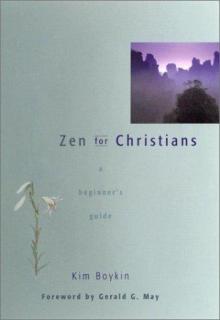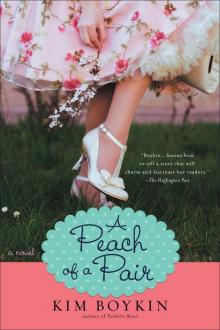- Home
- Kim Boykin
Zen for Christians: a beginner's guide Page 3
Zen for Christians: a beginner's guide Read online
Page 3
But then I started reading about the mystical and monastic traditions of Buddhism and Christianity, and I read William James's classic on the psychology of religion, The Varieties of Religious Experience, and I started to think that religion might have something to say to me after all. Both of my grandmothers had died during my sophomore year in college, which almost certainly contributed to my newfound interest in the deep issues of human life, though I made that connection only in hindsight.
In the fall of my senior year, my Buddhism class took a field trip one Saturday to Zen Mountain Monastery, in the nearby Catskill Mountains. I was intrigued by the monastery and felt a certain attraction to Zen, though I remember chatting with one of the monks and wondering how such a normal seeming guy had ended up shaving his head and devoting his whole life to Zen. In the spring, the Zen teacher from the monastery came to Vassar to give a talk, and afterward I inquired about the possibility of doing a retreat at the monastery. My friend Anne and I spent our spring break that year at the monastery, following the rigorous monastic schedule of work and meditation.
Monastic life turned out to be different in many ways from my image of bald men in medieval robes, in complete silence, copying manuscripts by hand. For one thing, there are both women and men in residence at Zen Mountain Monastery. The monastery usually has twenty to forty full-time residents, which at the time included about five "monastics"-their gender-inclusive term for monks and nuns-and now includes about twice that number. The rest of the residents are there for a limited period of time agreed on in advance, anywhere up to a year, without making or necessarily intending to make any longer commitment. And there are usually some twenty to forty guests each weekend for retreats.
The abbot and senior teacher of the monastery, John Daido Loori, Roshi, is from New Jersey and was raised Catholic. (The title Roshi, which literally means "old master," is used for a Zen teacher whose awakening has been certified by his or her own Zen teacher.) He counts Saint Teresa of Avila and Saint John of the Cross among his spiritual teachers. His Zen teacher, Taizan Maezumi, Roshi, was from Japan and founded the Zen Center of Los Angeles.
When I made my first visit to the monastery, only two residents had shaved heads: the abbot and the head monastic. In the meditation hall, residents wear Japanese-style robes-gray for students, black for monastics, white for senior lay students. The rest of the time, they wear ordinary clothes in black or other dark or neutral colors so as to blend in with the rest of the sangha, or community.
A day at the monastery is spent mostly in work and meditation. The daily schedule varies slightly, depending on the season, but a typical day begins with wake-up at 4:30 A.M. and zazen at 5:00-two thirty-five-minute sitting periods separated by five minutes of walking meditation-and a twenty-minute service mainly involving a lot of chanting and bowing. The day includes seven and a half hours of work, three good vegetarian meals, and some time for rest and relaxation. And the day ends with another block of two sitting periods at 7:30 P.M. and lights out at 9:30. Silence is generally kept from evening zazen through about 10:00 A.M. the next day. My favorite exception to this rule is that on Wednesday nights, cookies are served in the dining hall after evening zazen, and you can chat on "cookie night."
Like all newcomers to the monastery, Anne and I were taught the practice of counting the breath. I spent a lot of time noticing the noisiness of my brain and the complaints of my body about sitting completely still with a straight back, and I discovered the simple wonder of paying attention to what's actually happening. Immediately after doing zazen, I usually felt peaceful and relaxed, and I didn't feel much like talking or performing any unnecessary actions. But this was not a feeling of drowsiness or lethargy: I felt focused and alert and very aware of everything around me. During my whole stay at the monastery, but especially after zazen, I really enjoyed eating. Maybe this was simply because the food at the monastery was so much better than the food at school, but I think it was also because I was attending more than usual to the actions and sensations of eating.
The monastery supports itself by offering weekend and weeklong retreats, so a lot of the work of the monastery is that of running a retreat center. Guests are assigned a job each day, depending on what is needed-helping in the kitchen, housekeeping, gardening, lawn mowing, office work. Monastics and other long-term residents have an ongoing job. There's a head cook, an accountant, a work supervisor, a registrar, and so forth. The monastery residents don't make hand-illuminated copies of sacred texts, but they do make audiotapes and videotapes of Zen teaching and publish a quarterly journal, and one of the first things you notice in the office is all the computer equipment.
The monastery has the equivalent of a weekend, called hosan, from Sunday afternoon, after the weekend guests leave, through Tuesday afternoon. During hosan there is no schedule to follow and no rule of silence. Residents are on their own for meals, and you can leave the monastery grounds to go for a hike in the mountains or spend some time in New York City or just go to nearby Woodstock for ice cream. The television in the library is off-limits during the week but can be used during hosan. While Anne and I were visiting, a bunch of us watched a videotape of Return of the Jedi.
One week of each month is a sesshin, or intensive meditation retreat. During sesshin (pronounced "seh-sheen" or "seh- shin"), silence is kept at all times, and most of each day is spent in zazen.
Everything done at the monastery all day, all year, is part of the practice-not just zazen, but working, eating, even resting. And everyone there-monastics and laypeople, residents and guests-follows the same monastic schedule and discipline. The whole environment is designed to encourage and facilitate practicing at all times the awareness that is practiced in zazen: repeatedly noticing wandering thoughts and returning to full engagement with the present moment.
Several years after this visit to the monastery, I heard someone say, after some intensive Zen practice, that it felt like she'd had all the plaque scraped off her brain. That's how I felt at the end of my week's stay: like I had a fresh, clean, shiny brain. Especially for the first few days after leaving the monastery, I was more aware of all the meaningless and unnecessary chatter going on all the time-my own chattering, other people's chattering, and the incessant chattering in my brain. And I kept feeling like I was getting too much stimulation or doing too many things at the same time. As we drove away from the monastery at the end of the week, we were talking, listening to the radio, and watching the snow hit the windshield, and this seemed like two too many things to be doing at once, like this was more than one could fully attend to. Back at school, I found that I had an easier time taking care of tasks that I ordinarily would have put off or grumbled about.
Shortly after my college graduation in 1987, during a cross-country drive from New York to Los Angeles with my aunt and my college possessions, I became suddenly and painfully aware of my own mortality and finitude, my small ness and powerlessness in the universe. I recognized for the first time, in a gut way, that I would eventually die and that I wouldn't be consulted about whether that was OK with me. Like it or not, sooner or later, I would die. I felt terrified and confused, like my world had turned inside out. I wondered how people could so blithely go about their daily lives knowing that they were going to die. I felt as though now I really understood the existentialist philosophers I'd read in college, the "sick soul" of William James, and the story of the Buddha, a pampered, sheltered prince who was in his twenties before he discovered some of the fundamental realities of human existence: aging, illness, and death.
I suppose you might call this crisis a conversion experience, in that it decisively and permanently reoriented my life, propelling me on my religious search. But we usually imagine conversion experiences as joyful, and this experience was horrifying. I was glad, some years later, to read what Susan Howatch, author of a series of novels about the Anglican Church, says about her own conversion: "I felt as if God had seized me by the scruff of the neck, slammed me against the n
earest wall, and was now shaking me until my teeth rattled." She adds, "Why people think a religious conversion is all sweetness and light I have no idea. It must be one of the big spiritual misconceptions of our time."
I spent that summer in Hawaii with my mom and stepdad, who were living there at the time, but I didn't much enjoy my exotic locale. I slept as much as possible-my preferred method of escaping myself and the world-and read anything that I thought might help me understand what was going on with me and what to do about it, mainly books on religious experience and meditation.
That fall, I moved to Boulder, Colorado, to start a Ph.D. program in philosophy at the University of Colorado. Boulder is a center for Tibetan Buddhism in the United States, and I began a regular meditation practice there, with the support of classes and weekend meditation retreats at the Naropa Institute (now Naropa University), a small college in Boulder founded by Tibetan Buddhist teacher Chogyam Trungpa. I also read some of the classics of the Christian contemplative tradition: The Cloud of Unknowing, Saint John of the Cross's Dark Night of the Soul, and Thomas Merton's New Seeds of Contemplation. I quickly discovered that philosophy wasn't going to address the Big Questions in a way that would satisfy me, and I sat in my philosophy classes wondering if the other students actually cared about the issues we were discussing and, if so, why. My undergraduate adviser had warned me that I wouldn't like graduate study in philosophy, and he was right. I dropped out of the Ph.D. program shortly after the start of my second semester.
By that point, my religious search was by far the most important thing in my life. The questions of life and death were urgent and painful and unrelenting, and I wanted to devote some time to single-minded, wholehearted spiritual practice. So I spent three months of the fall of 1988 at Zen Mountain Monastery, the monastery I had visited in college.
After that, I returned to Boulder and transferred into the graduate program in religious studies at the University of Colorado, but I quickly became frustrated that no one seemed to want to talk about religion in relation to their own lives. They were observing religion from the outside, as anthropologists and sociologists, and I realized that I was primarily interested in exploring religion from the inside. At that point I didn't want to be reading and writing and talking about religion; I wanted to be practicing it. So I quit the religious studies program and went back to the Zen monastery, this time for a year's residency, beginning in the summer of 1989.
When I tell people that I lived at a monastery, they often say something like, "That must have been so peaceful." But peaceful is not one of the adjectives that comes to mind. I remember thinking that the schedule felt relentless. The experience was intense, challenging, difficult. I almost always felt sleep-deprived. I was only twenty-three at the time and was dealing with basic issues of growing up-work, relationships, and so forth-at the same time as questions about life and death. I once asked one of the monastics, "Don't you sometimes wish you believed in Someone you could pray to for help?" but he looked at me uncomprehendingly and said no. I learned a lot about myself during my time at the monastery but felt afterward that it might have been too much all at once.
My future husband Brian and I dated during my year's residency at the monastery. We had met two years earlier through the Buddhist community in Boulder, but we got together long-distance, writing letters while I was in New York and he was in Colorado, and he came out to the monastery three times to visit. Brian was teaching at the University of Colorado while finishing his dissertation in theology for the University of Chicago. After my year at the monastery, I returned to Boulder to be with Brian-who had just finished a thirty-day silent retreat at a Jesuit retreat center. We got married two years later.
Although Brian is Boston Irish-Catholic and my background was Southern California agnostic, we somehow ended up with strikingly similar worldviews. When we moved in together, between the two of us we had no car, no couch, and no television, but we had two computers, three zafus, and five copies of The Cloud of Unknowing (in three different translations).
Toward the end of my time at the monastery and especially after I moved back to Boulder, I was really struggling with my Zen practice and my Zen teacher. On Thursday nights, Brian and I sat with a small Zen group that met in the basement of the Tibetan Buddhist center downtown, but that was all the Zen practice I was doing, and even that felt like a chore. At the monastery, I had realized that I had never had to work for much of anything in my life and had never done much of anything requiring discipline. School work had come easily; I was never involved in sports; I had quit piano lessons after a year and a half. And I was discovering that some of the most important things in life-spiritual practice and committed relationships-take work and discipline. I tended to give myself guilt trips about not sitting much, thinking things like, "What will help me be at peace is to sit, but I really don't feel like sitting, but by not sitting I'm contributing to my own unhappiness, and isn't that stupid." Naturally, this line of thinking didn't exactly inspire me to spiritual discipline. It just made me feel guilty on top of not being at peace.
I finally figured out that at least part of what I had been thinking of as existential angst or a "dark night of the soul" was garden-variety depression, so I started to see a therapist. But I didn't trust an exclusively therapeutic worldview, and I felt like I needed some sort of spiritual guidance also. Brian knew a Catholic nun who worked at the Jesuit retreat center where he'd done his thirty-day retreat, and he thought I'd hit it off with her. I did. I went to the retreat center every few months for a two- or three-day silent retreat and met with Sister Eleanor for spiritual direction. This didn't seem like a radical shift to me-talking about my spiritual life with a Catholic nun instead of a Zen teacher. I had been getting inspiration for my Buddhist practice from the Christian mystics all along, and Eleanor was happy to work with me even though I wasn't Christian. One welcome difference from the Zen monastery was that Eleanor encouraged me to relax and get lots of rest while I was on retreat.
A big part of my struggle with my spiritual practice was that I had smashed up against the limits of my own willpower. The style of practice at the Zen monastery at that time felt willful, effortful, goal-oriented, and that was my own approach to Zen practice. I thought it was all about pushing for kensho-an enlightenment experience, or "breakthrough"-but I hadn't had any breakthroughs. Buddhism is supposed to be about liberation from suffering, but I was still miserable.
Both Zen and Christianity teach that our liberation is not something we can earn or create or achieve, but it was in the Christian tradition, through my retreats with Eleanor, that I finally started to understand what this means. I had begun to recognize the vital importance of grace. I had begun to recognize that if my liberation depended on me or anything I did, it was hopeless.
Gerald May's Will and Spirit, a book on the psychology of contemplative spirituality, helped clarify my struggles and gave me some vocabulary for the "willingness" of true contemplative practice as opposed to the "willfulness" with which I had been practicing Zen. I had been trying to use my spiritual practice to get what I wanted, when spiritual practice is actually about being with reality as it is. I had been trying to satisfy my own will instead of opening to God's will. No wonder my practice had been such a struggle!
With this new insight into spiritual practice, I thought that now I could get back into Zen and practice willingness instead of willfulness. But whenever I started to think about it, I would immediately get caught up in thoughts about how it would be good for me. That is, I would immediately fall back into making my Zen practice an instrument of my will. So I decided I'd better give my Zen practice a rest for a while longer, since it seemed only to exacerbate my willfulness.
An insight I was missing at the time was that of course I would practice willingness willfully-that's natural and inevitable-and my willfulness could be treated like any other wandering thought that arises during meditation: notice the willful thought, and return my attention to the presen
t moment. Notice, return, notice, return, notice, return-that's what Zen practice is. It was fine if I kept noticing myself thinking, "I will be willing!" But I didn't get that then.
I had told Eleanor, when I started doing retreats with her, that I could talk God language but had no idea what to do with Jesus. Tentatively, after many meetings, she suggested that I might want to try a little visualization: Imagine that Jesus is walking toward you. What do you do? She had intended for me to go off to the chapel or someplace later in the day and try this, but I did it right when she said it. I was in a high meadow in the Sierras, and a stereotypical Jesus, with beard and flowing robe and sandals, was walking toward me on a little path. As he got closer, I ran up to him, fell down at his feet with my arms wrapped around his ankles, and, crying, said, "I'm so glad you're here!" He would know exactly what I needed. He would be able to help me. Jesus had apparently made his way into my psyche despite my essentially secular upbringing.
Eleanor got to hear a lot about my vocational cluelessness as well as my difficulties with spiritual practice. After returning to Boulder, I had fallen into a job as an assistant teacher at a preschool affiliated with Boulder's Buddhist community. It was stressful and exhausting work, but as Brian noticed, the twoyear-olds brought out a compassionate part of me that had been largely dormant for several years while I had been so preoccupied with my own pain and struggles. After a series of other miscellaneous jobs, including working at a bookstore and at the public library and doing freelance proofreading for two academic publishers, I decided to give graduate school one last try. I realized that what I'd actually been interested in all along was theology, not philosophy or religious studies, and I wanted to study Christianity in depth.

 Just In Time for Christmas
Just In Time for Christmas Flirting with Forever (Island Bliss)
Flirting with Forever (Island Bliss) Steal Me, Cowboy (Copper Mountain Rodeo)
Steal Me, Cowboy (Copper Mountain Rodeo) Caught Up in You
Caught Up in You The Wisdom of Hair
The Wisdom of Hair Zen for Christians: a beginner's guide
Zen for Christians: a beginner's guide A Peach of a Pair
A Peach of a Pair